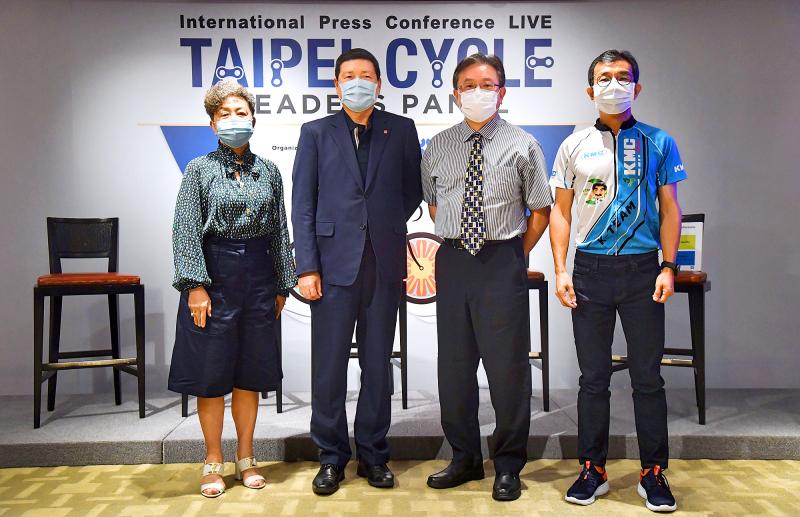Local bicycle makers expect demand to continue outpacing supply due to orders triggered by the COVID-19 pandemic, with some companies seeing orders back up through next year.
“Next year is all full in terms of orders. Our lead time on components is one year,” Giant Manufacturing Co Ltd (巨大機械) chairwoman Bonnie Tu (杜綉珍) told a news conference in Taipei organized by the Taiwan External Trade Development Council (TAITRA) to announce next year’s Taipei Cycle Show.
The pandemic has reduced bicycle supplies and increased demand around the world, Robert Wu (吳盈進), chairman of KMC (Kuei Meng) International Inc (桂盟國際), one of the world’s biggest bicycle chain makers, told reporters.

Photo: CNA
“Understand that from February to May all of the bicycle-making countries in the world were effectively at a standstill, with only a two-month supply of components at hand — this caused a massive shortage,” Wu said.
“We are still in the process of making up that shortage,” he said. “We have not even begun to meet the virus-related increase in demand for bicycles. Those orders must stand in line and wait.”
Merida Industry Co Ltd (美利達) chairman Michael Tseng (曾崧柱) said that the “explosion in demand” is a “happy problem.”
Beset by virus-related production and retail issues, all bicycle exports, except for electric bicycles, in the first seven months of this year declined by 29.7 percent to 905,000 units from 1.28 million units in the same period last year, data compiled by the Taiwan Bicycle Association showed.
Electric bicycle exports rose in that same period to 410,000 units from 339,000 units a year earlier, association data showed.
The US is the largest export market for all bicycles, except for electric bicycles, accounting for 38.2 percent of the market, while the Netherlands is the largest export market for electric bicycles, accounting for 33.6 percent of the market, the data showed.
“I would run our production lines around the clock if I could, but we are facing a 10 percent labor shortage,” Tu said, adding that many foreign workers have not been allowed to return to Taiwan due to disease prevention efforts.
After being canceled this year, the Taipei Cycle Show is to return next year as an O2O, or online to offline, event, TAITRA president and chief executive officer Walter Yeh (葉明水) said.
“While it is, of course, best for customers to participate in person, we will make sure they get all the information they need digitally,” he said, adding that the council would help local businesses with online marketing and promotion.
Electric bicycle sales have been especially strong, growing 21 percent annually in the first seven months, despite virus-related supply issues and retail bottlenecks, Yeh said.
Although a shift to digital promotion has been hastened by the pandemic, Tu said that she expects the changes to benefit bicycle makers over the long term.
“Instead of flying journalists to news events, we can simply supply them with the information online and then deliver a sample bicycle to them to test,” she said.
The Taipei Cycle Show is to take place from March 3 to March 6 next year at the Taipei Nangang Exhibition Center’s halls 1 and 2.
Taipei Cycle Online, which is to debut on March 3 and continue for one month, is to include forums, audio-visual conferences and livestreaming from the offline show.

In Italy’s storied gold-making hubs, jewelers are reworking their designs to trim gold content as they race to blunt the effect of record prices and appeal to shoppers watching their budgets. Gold prices hit a record high on Thursday, surging near US$5,600 an ounce, more than double a year ago as geopolitical concerns and jitters over trade pushed investors toward the safe-haven asset. The rally is putting undue pressure on small artisans as they face mounting demands from customers, including international brands, to produce cheaper items, from signature pieces to wedding rings, according to interviews with four independent jewelers in Italy’s main

Japanese Prime Minister Sanae Takaichi has talked up the benefits of a weaker yen in a campaign speech, adopting a tone at odds with her finance ministry, which has refused to rule out any options to counter excessive foreign exchange volatility. Takaichi later softened her stance, saying she did not have a preference for the yen’s direction. “People say the weak yen is bad right now, but for export industries, it’s a major opportunity,” Takaichi said on Saturday at a rally for Liberal Democratic Party candidate Daishiro Yamagiwa in Kanagawa Prefecture ahead of a snap election on Sunday. “Whether it’s selling food or

CONCERNS: Tech companies investing in AI businesses that purchase their products have raised questions among investors that they are artificially propping up demand Nvidia Corp chief executive officer Jensen Huang (黃仁勳) on Saturday said that the company would be participating in OpenAI’s latest funding round, describing it as potentially “the largest investment we’ve ever made.” “We will invest a great deal of money,” Huang told reporters while visiting Taipei. “I believe in OpenAI. The work that they do is incredible. They’re one of the most consequential companies of our time.” Huang did not say exactly how much Nvidia might contribute, but described the investment as “huge.” “Let Sam announce how much he’s going to raise — it’s for him to decide,” Huang said, referring to OpenAI

The global server market is expected to grow 12.8 percent annually this year, with artificial intelligence (AI) servers projected to account for 16.5 percent, driven by continued investment in AI infrastructure by major cloud service providers (CSPs), market researcher TrendForce Corp (集邦科技) said yesterday. Global AI server shipments this year are expected to increase 28 percent year-on-year to more than 2.7 million units, driven by sustained demand from CSPs and government sovereign cloud projects, TrendForce analyst Frank Kung (龔明德) told the Taipei Times. Demand for GPU-based AI servers, including Nvidia Corp’s GB and Vera Rubin rack systems, is expected to remain high,